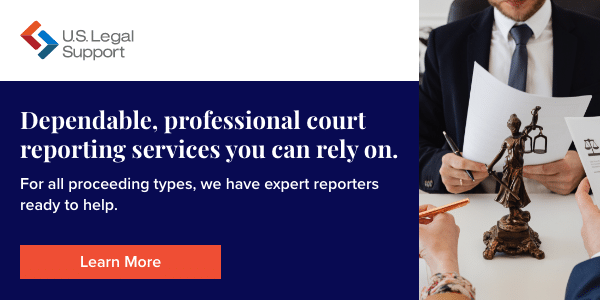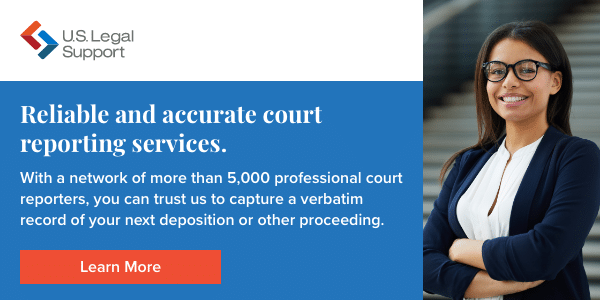What is a Digital Reporter? Explained.

Court reporting relies on professional skill and technology regardless of the methodology. All court reporting methodologies lead to the production of a final, verbatim transcript of a deposition, trial, or other legal proceeding. So, what is a digital reporter?
The first thing to keep in mind about a digital reporter is that their primary function is the same as other types of court reporters: a trained, certified professional who understands civil procedure and is present for the duration of the proceeding.
Digital reporters utilize high-performance audio recording equipment, specialized software, and other technology to capture an accurate record.
This is not a “set it and forget it” recording that relies solely on technology, however. Digital reporters continuously monitor the proceeding, all technology, and the speech-to-text output to ensure a verbatim record. They also:
- Add annotations to identify speakers and keywords
- Speak up to interrupt the proceeding for clarification if needed
- Provide troubleshooting of any hardware and software issues
- Monitor back-up audio and other equipment
Technology and Equipment Used by Digital Reporters
Digital reporters use the latest technologies to help optimize recording abilities. These include:
- High-quality audio recording devices
- Redundant audio backup systems to protect against potential technology glitches
- Multi-track recording to identify each speaker
- Strategic placement of devices to capture key speaker locations throughout the room
The Role of Digital Reporters Beyond Technology
Mastering devices and software is key to the work of digital reporters, but their responsibilities and duties don’t end there. Digital reporters are certified professionals, notary publics, and a vital part of the legal process.
In addition to monitoring the technology to ensure a verbatim record, digital reporters also:
- Administer the oath to swear in witnesses
- Mark and manage introduced exhibits
- Read back the transcript upon request by counsel
- Pause the proceeding to correct mumbling, nonverbal responses, or overlapping speech
What Makes a Top-Notch Digital Reporter
To become a digital reporter, one must complete a training program, and earn one or more professional association certifications. Beyond that, effective digital reporters have skills and knowledge such as:
- Technology know-how (including staying on top of new developments)
- Ability to operate and provide basic troubleshooting for devices and software
- Strong attention to detail
- Patience and ability to maintain focus for long periods
- Accurate note-taking capabilities
An added bonus for digital reporters is having a background in the legal profession, specifically with unique terminology and practice areas.
The Future of Digital Reporting
When it comes to the future of digital reporting, we can expect demand, advances in technology, and preference to all play a role in the continued growth. Look forward to:
Increased Adoption to Help Meet Demand Nationwide
The demand for court reporters is on the rise while the supply is not keeping pace. The need for reporters has helped accelerate the adoption of digital reporting and the willingness to utilize multiple types of reporting methodologies.
On top of this, more states are encouraging digital reporting. In fact, New York and South Carolina have even initiated digital reporting training programs.
Increased Capabilities Due to Advancements in Artificial Intelligence
Court reporting has always blended human oversight and skill with the best technology available. Digital reporting is no exception – with this methodology, legal professionals can choose to leverage a realtime feed, which leverages a combination of AI-based transcription software with automatic speech recognition technology (ASR).
As the development of AI and machine learning continues, it’ll likely be further adopted into digital reporting.
Choose U.S. Legal Support for Your Court Reporting Needs
At U.S. Legal Support, the choice is yours. No matter which type of professional court reporter you’d prefer for your needs, we can help connect you. We work with a nationwide network of 5,000+ professional court reporters to serve in-person, remote, and hybrid proceedings.
For nearly 30 years, we’ve provided all-inclusive litigation support services. In addition to court reporting and transcription, we also offer record retrieval, litigation consulting, interpreting and translation services, and more, managed through our secure Client Portal.
Reach out today to discuss your legal needs or secure a court reporter.
Sources:
U.S. Bureau of Labor Statistics. 27-3092 Court Reporters and Simultaneous Captioners. https://www.bls.gov/oes/current/oes273092.htm
The Marshall Project. In Court, Where Are Siri and Alexa? https://www.themarshallproject.org/2019/02/14/in-court-where-are-siri-and-alexa
Coruzant. 4 Things to Know About the Future of Digital Court Reporting. https://coruzant.com/digital-strategy/4-things-to-know-about-the-future-of-digital-court-reporting/

Editoral Policy
Content published on the U.S. Legal Support blog is reviewed by professionals in the legal and litigation support services field to help ensure accurate information. The information provided in this blog is for informational purposes only and should not be construed as legal advice for attorneys or clients.



